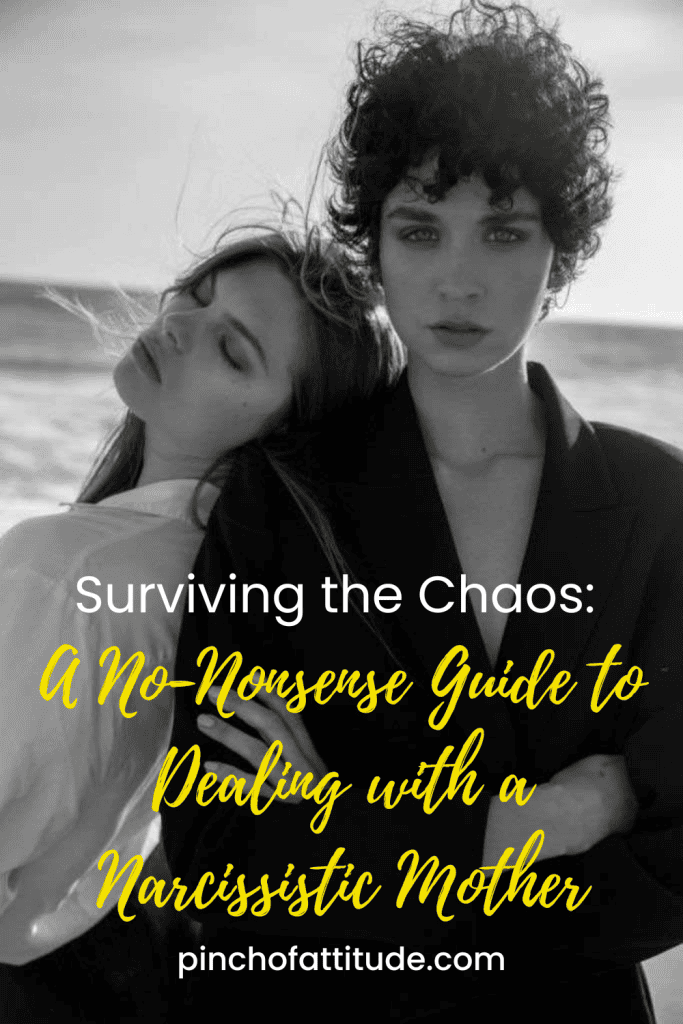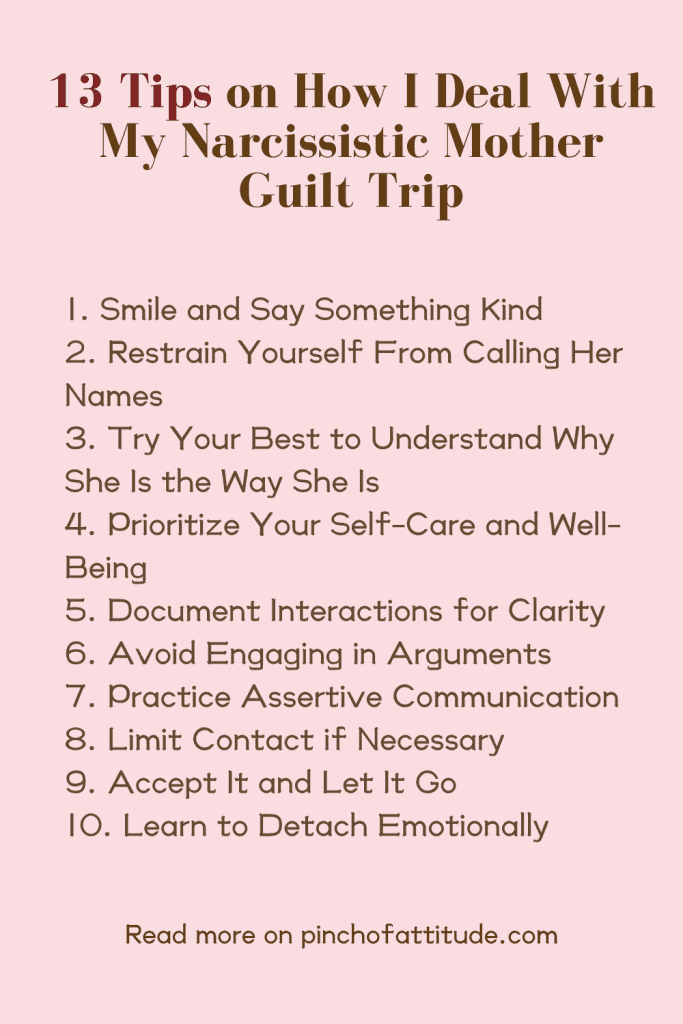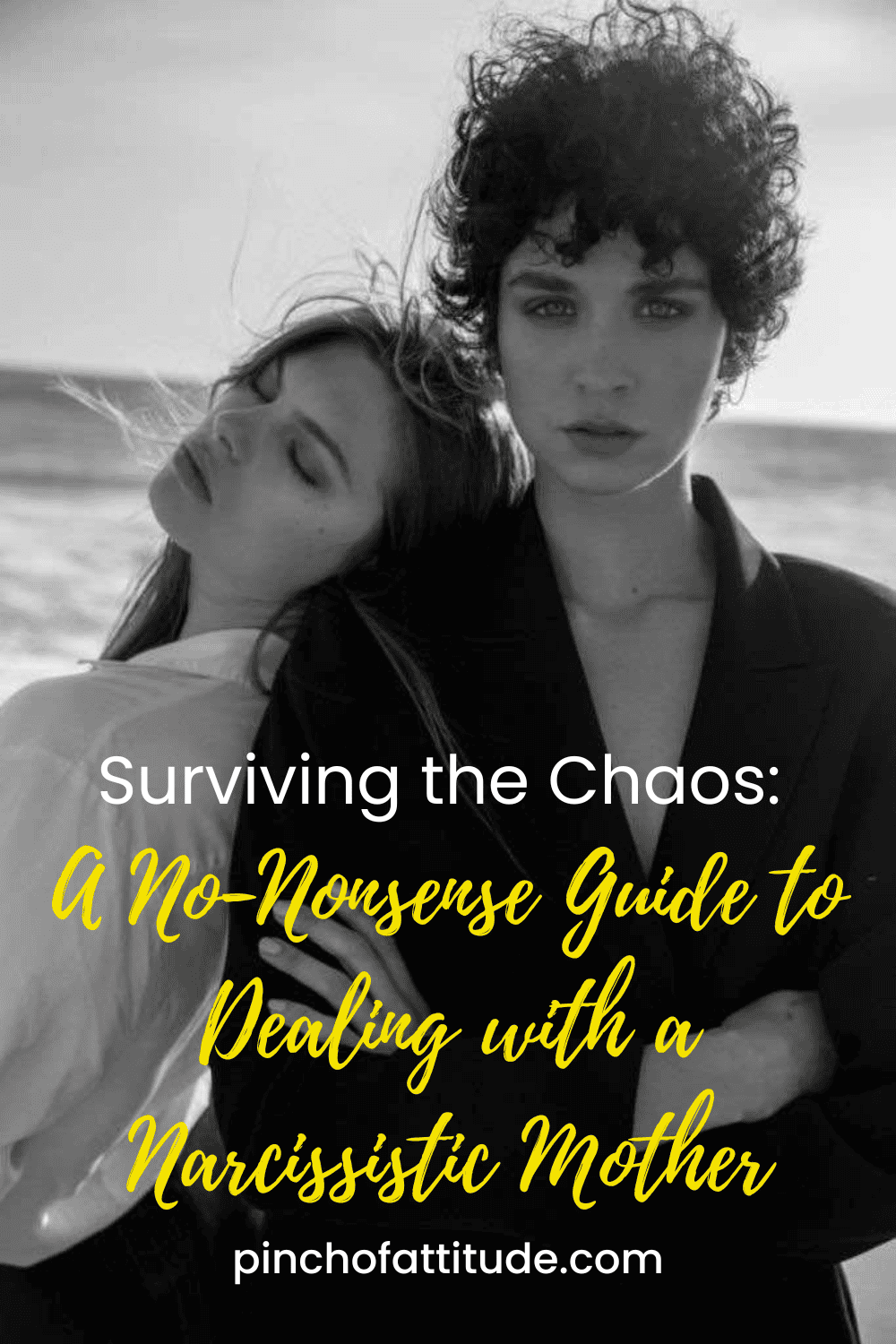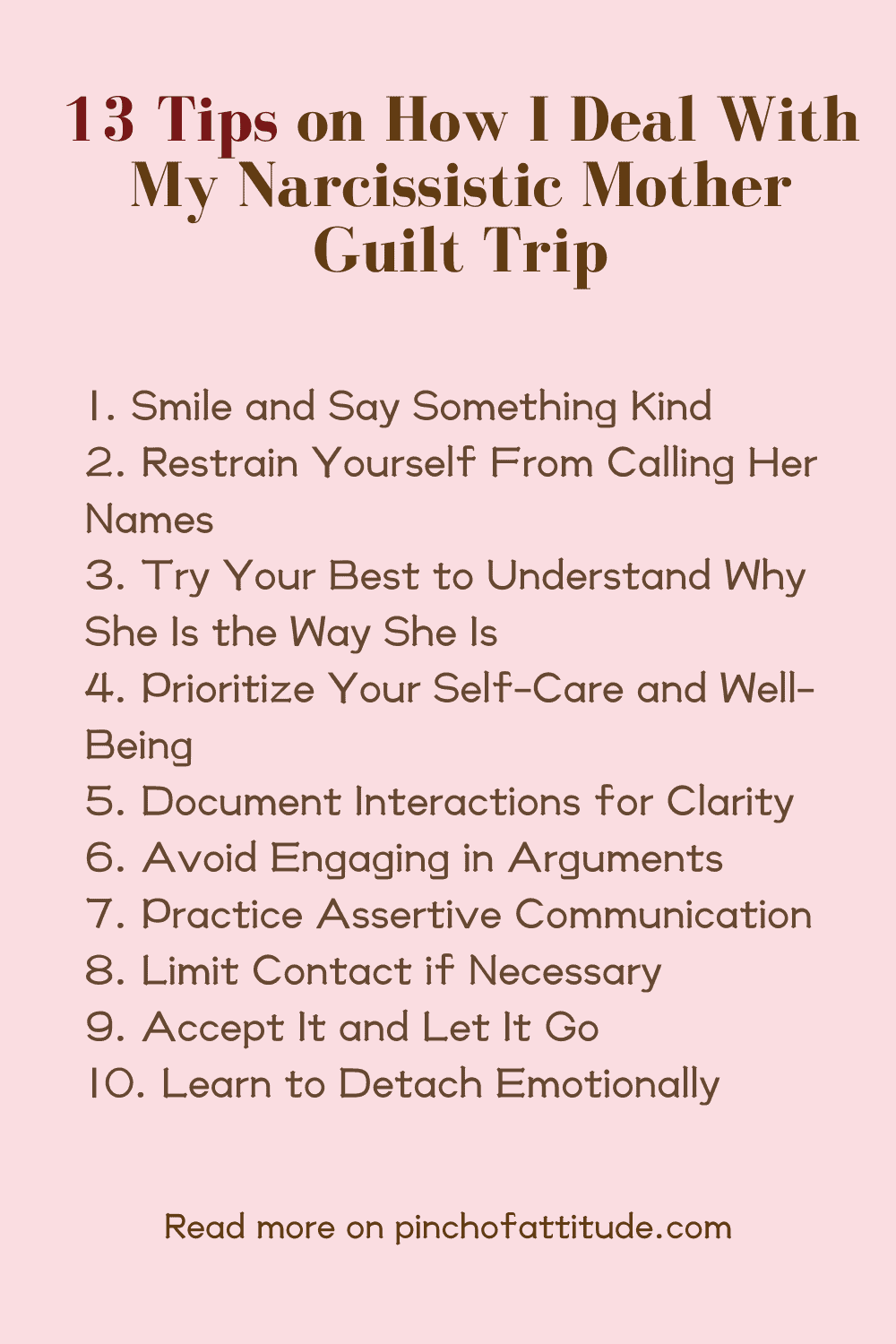Dealing with a narcissistic mother guilt trip is no easy feat, at least for me it wasn’t.
From a young age, I grappled with the weight of her unrealistic expectations and values, which often left me feeling inadequate and unworthy.
It is a struggle many can relate to, and in my journey to overcome this emotional burden, I’ve learned a few valuable lessons.
Below, I’ll share the strategies I have honed, drawing from my experience as a black sheep in the family, my supportive network outside it, and my passion for self-discovery.
These insights have been my lifeline, empowering me to break free from the suffocating grasp of a narcissistic mother’s guilt trip.
- Prioritize kindness over confrontation when dealing with a narcissistic mother. Responding with a smile and a kind word can disarm manipulative tactics.
- Avoid engaging in arguments with your narcissistic mother as it’s like adding fuel to the fire. Instead, choose disengagement over confrontation.
- Seek therapy or counseling to gain insights, heal, and strengthen your ability to deal with her manipulative behaviors.
Table of Contents
How I Deal With My Narcissistic Mother Guilt Trip?

My narcissistic mom uses guilt-tripping like a pro. She should won a gold medal for that.
It wasn’t easy or fun, but through my experiences, I’ve come up with strategies that helped me overcome the heavy burden of unrealistic expectations and self-doubt.
From simple acts of kindness to seeking professional help, I was able to find peace, build resilience, and ultimately break free from the grip of this emotional turmoil.
1. Smile and Say Something Kind
It may sound deceptively simple, but it’s a powerful tool in maintaining your own emotional balance.
When faced with my mother’s unrealistic expectations and harsh criticisms, I’ve found that reacting with anger or defensiveness only fuels the negativity.
Instead, offering a genuine smile and a kind word can defuse the situation.
It’s not about agreeing with her unreasonable demands or accepting blame that isn’t yours, but rather about disarming her manipulative tactics.
By responding with kindness, you not only avoid falling into her emotional trap but also create a subtle shift in the dynamic.
It can catch her off guard, disrupt the cycle of guilt-tripping, and potentially lead to more constructive conversations.
It is a small but significant step in regaining control and protecting your own well-being in the face of a narcissistic mother’s manipulation.

2. Restrain Yourself From Calling Her Names
There was one evening when my mother’s unrealistic demands and hurtful comments reached a boiling point as she criticized my choices and lifestyle.
The frustration and anger welled up inside me, and I was on the brink of responding with equally hurtful words. It was tempting to call her names or lash out in anger.
But I’ve learned the hard way that name-calling and confrontations usually lead to more turmoil rather than resolution.
Instead of descending into an ugly confrontation, I took a deep breath and excused myself from the situation. I retreated to a quiet place, allowing my emotions to settle.
Because I resisted the temptation to engage in name-calling and chose to walk away instead, I not only protected myself from further emotional harm but also maintained a sense of dignity and self-control.
It’s a powerful strategy to disengage from the cycle of negativity and prevent it from spiraling out of control.

3. Try Your Best to Understand Why She Is the Way She Is
Attempting to understand her motivations and background has proven to be a crucial strategy. It might not always be easy, but it’s an exercise in empathy and self-preservation.
I’ve often pondered what could have shaped my mother’s unrealistic values and her inclination to resort to guilt trips.
By delving into her past, I discovered that her upbringing and life experiences played a significant role in molding her into the person she is today.
It doesn’t excuse her behavior, but it sheds light on the roots of her actions.
This understanding has enabled me to approach our interactions with greater empathy. It allowed me to see her as a complex individual with her own struggles and insecurities.
It’s a subtle shift in perspective that helps me maintain my emotional balance and engage in more constructive conversations.
When you’re able to comprehend the “why” behind her actions, you’ll be taking a significant step towards depersonalizing her guilt trips and protecting your own well-being in the process.
This strategy, while challenging, can contribute to healthier dynamics when dealing with a narcissistic mother.
4. Prioritize Your Self-Care and Well-Being
As daughters of narcissistic mothers, the importance of prioritizing self-care and well-being cannot be overstated.
I would even say it’s a strategy born out of necessity and self-preservation. One particular chapter of my life vividly illustrates this point.
I found myself entangled in a never-ending cycle of guilt and emotional manipulation, where my mother’s unrealistic demands and criticisms took a toll on my mental and emotional health.
It was a breaking point that made me realize that I needed to put myself first for a change.
When I did, I was able to step away from the constant emotional turmoil. This meant setting boundaries, seeking therapy, and engaging in activities that nourished my spirit.
It was a process that allowed me to rebuild my self-esteem, regain emotional stability, and cultivate resilience.
It’s a reminder that taking care of oneself is not selfish but an essential act of self-preservation so you can emerge stronger and with your well-being intact.

5. Document Interactions for Clarity
In dealing with my mom’s narcissism, journaling at night became my lifeline. I started doing this during a particularly trying period when my parents were going through a divorce.
Each night, I’d sit down with pen and paper, pouring my thoughts and emotions onto the page.
It allowed me to record the hurtful words and unrealistic demands my mother had thrown my way. More importantly, it provided a sense of clarity and detachment from the emotional storm.
Through this practice, I could step back and analyze the interactions from a more objective perspective.
It became a powerful tool to identify patterns in her behavior and understand how her guilt trips affected me.
As my mother’s manipulation escalated during the divorce, my journal became a record of the emotional toll it took on me.
Documenting these interactions not only served as a form of emotional release but also offered me a clearer insight into the dynamics at play.
It was an essential step towards maintaining my emotional well-being and finding ways to cope with the challenges of living with a narcissistic mother.
6. Avoid Engaging in Arguments
Avoiding arguments with a narcissistic parent is hard, but it is necessary. A particular episode from my life exemplifies the wisdom of this approach.
During a heated argument with my narcissistic mother, her unrealistic expectations and harsh criticisms reached a crescendo.
The emotional tension in the room was palpable, and as an adult child, I was all too familiar with the feeling of guilt that often accompanied these confrontations.
The harmful behavior of engaging in an argument, which I’d fallen into in the past, was a pattern I was determined to break.
In that pivotal moment, I consciously chose not to argue. Instead, I took a deep breath and calmly disengaged from the confrontation.
This strategic withdrawal prevented the situation from escalating further, allowing the emotional storm to subside.

7. Practice Assertive Communication
Being assertive allows me to express my needs and boundaries while maintaining respect and dignity.
For me, assertive communication isn’t about engaging in confrontations or adopting an aggressive stance. It’s about finding a balanced and respectful way to navigate these complex dynamics.
When I’m faced with my narcissistic parent’s unrealistic demands and harsh criticisms, the power of assertive communication shines.
This strategy empowers you to stand your ground, ensuring that your voice is heard while preserving your emotional well-being and self-worth.
Although it’s not easy, practicing assertive communication has become a vital component of managing and, when possible, improving the dynamics of my relationship with my mom.
8. Limit Contact if Necessary
While it can be a difficult decision, going low or no contact, or even deciding to cut off a narcissistic mother entirely, is an act of self-preservation.
There have been instances when I felt overwhelmed by the emotional turmoil caused by my parent’s unrealistic demands and guilt-inducing behavior.
It became apparent that I needed a breather to protect my well-being.
In such moments, I made the choice to limit contact. This doesn’t mean cutting ties entirely, but rather establishing boundaries and reducing the frequency of interactions.
It allowed me to create a safe distance to regain emotional balance, refocus on self-care, and find clarity.
Through this step, I regained control over my life and set the terms for our interactions.
Limiting contact, when necessary, is an act of self-compassion. It ensures your emotional well-being remains a priority while dealing with the challenges of a narcissistic parent.
9. Accept It and Let It Go
Narcissistic parents use guilt as a weapon to manipulate their children, often making them feel like the family scapegoat.
Accepting and letting go of this fact removes its hold on you, and you can finally start healing.
My own narcissistic mother uses guilt as a means of emotional abuse.
And my anger, frustration, and disappointment towards her threatened to consume me. However, I realized that holding onto these emotions only added to my suffering.
So, I consciously chose to accept that her narcissistic behavior was beyond my control and decided to let go of the emotional baggage.
It wasn’t about excusing her actions but about liberating myself from the persistent grip of resentment and guilt.
Doing this allows you to reclaim your emotional well-being, foster inner peace, and move forward.

10. Learn to Detach Emotionally

Emotional detachment isn’t about becoming cold or indifferent. In my experience, it’s a survival skill that allows you to protect your well-being and sanity.
Firstly, you’ll want to set clear boundaries.
Define what you will and won’t tolerate in your interactions with your narcissistic parent. These serve as a shield, preventing their emotional manipulation from penetrating your core.
It also helps to develop healthy coping mechanisms so you can maintain emotional balance.
Engage in activities that bring you joy, whether it’s pursuing a hobby, spending time with supportive friends, or seeking professional therapy.
Lastly, practice self-compassion.
Detaching emotionally is an act of self-preservation, not a rejection of your parent. Be gentle with yourself and acknowledge that you’re doing what’s necessary for your well-being.
11. Stay Grounded in Your Truth
When dealing with a narcissist, staying grounded in your truth is a beacon of strength.
This strategy is rooted in the understanding that narcissistic parents often seek to manipulate and control their children into giving them what they want.
Knowing and holding on to your truth becomes crucial in this battle. Your truth is your compass, guiding you through the storm of guilt trips and unrealistic demands.
My toxic mother will often attempt to bend my reality to get what she wants. But by staying grounded in my truth, I am able to resist her attempts to distort my self-perception.
This steadfast connection to my core values and self-worth empowers me to make choices that align with my authentic self.
So, hold on to your truth and reclaim your autonomy. It’s a powerful strategy that will allow you to live your best life, unburdened by your mom’s manipulation tactics.

12. Cultivate a Strong Support System
Despite my mom’s narcissistic abuse, I found solace and strength by cultivating a strong support system, and my anchor was my father.
He personified the qualities of logic and kindness, providing a stark contrast to my mother’s unrealistic expectations and emotional manipulation.
My father’s presence served as a safe haven, a sanctuary where I could seek refuge from the storm of guilt trips and harsh criticisms.
His unwavering support and understanding helped me maintain my emotional balance and self-worth.
While the challenges of dealing with a narcissistic parent can be isolating, a support system can offer reassurance and validation.
Whether it’s a parent, friend, or therapist, these individuals become your allies in the battle for emotional well-being.
Cultivating a strong support system is not just a strategy. It’s a lifeline, offering comfort and guidance as you navigate the turbulent waters of a narcissistic parent’s manipulation.
13. Seek Therapy or Counseling
Getting professional help is an essential step towards breaking free from the shackles of my mother’s toxic words and the perpetual guilt she had instilled in me.
I took the decision to seek therapy when I turned 25, a choice that I can now say was much needed.
Therapy provided a safe and supportive space to unpack the emotional baggage I had carried throughout my life.
It offered me a profound understanding of my mother’s behavior and how it had shaped my own responses.
Therapy empowered me to deal with her manipulations in a much stronger and healthier way. It became a tool for healing, self-discovery, and personal growth.
By seeking therapy or counseling, you equip yourself with the tools and insights needed to navigate the complexities of life with a narcissistic parent.
Ultimately, you’d be able to free yourself from the guilt and emotional turmoil they may have sown.
Here Are Some of the Ways My Narcissistic Mother Lays Guilt Trips on Me
Dealing with a narcissistic mother can be a relentless journey fraught with emotional landmines. One of the most pervasive and damaging tactics used by such mothers is guilt-tripping.
Here are some of the ways my narcissistic mother lays guilt trips on me:
- Emotional blackmail: It’s common for narcissistic parents to use blackmail as a type of emotional abuse. My mother employs emotional threats and plays the victim to manipulate me into doing what she wants.
- Conditional love: Her affection and approval are contingent upon my behavior or choices. It is a form of manipulation designed to make you feel like you must comply with her wishes or else you don’t deserve her love.
- Comparison to others: My mother frequently compares me unfavorably to my siblings and friends. She would even include herself in these comparisons, further emphasizing my perceived shortcomings.
- Rewriting history: As with people diagnosed with narcissistic personality disorder, my mom often distorts past events to portray them in her favor and creates a perception that you owe her something.
- Minimizing my feelings: Among the telltale signs of a narcissistic parent is the habit of disregarding their children’s emotions or accomplishments. My mom consistently insists that her issues or achievements are more significant than anything I experience or achieve.
- Using obligation: Children of narcissistic parents frequently encounter situations where they remind you of the sacrifices they’ve made for you. They often try to make you feel ungrateful and as if you owe them endlessly.
- Involve others in her toxic conversation: Triangulation is a common tactic that narcissists use, where they involve other family members or friends in disputes. My mom, for example, often presents a skewed version of events to isolate or pressure me, even if it’s based on distortions and untruths.
- Playing the martyr: She often attempts to make herself out to be the self-sacrificing mother who has given everything for me.
- Gaslighting: This manipulation tactic makes me question my own thoughts and feelings, leading me to doubt myself. Consequently, I ended up trusting my mother’s version instead.
- Withholding affection: She often employs silent treatment to make you feel guilty. When you don’t comply with her wishes, she pulls away emotionally or physically, leaving you with the impression that you’ve done something wrong.
- Setting me up for failure: It’s not uncommon for my narcissistic mother’s guilt-tripping to involve her intentionally creating situations where I’m set up to fail or fall short. These scenarios are later used to lay on guilt, further complicating our relationship.
- Emphasizing dependency: Her manipulation tactics may make you feel like you cannot function without her or that all your successes are solely due to her input. This emphasis on dependency is a common trait in the behavior of narcissistic parents.
- Projecting blame: Instead of taking responsibility for her own actions, my mom has a habit of projecting blame onto me. Suggesting that I am the one making her feel guilty for things that were not my fault is a recurring pattern in our interactions.
Related Posts:
- 25 Characteristics of a Narcissistic Mother: You’re Not Alone
- 13 Challenges I Had to Overcome While Growing Up With a Narcissistic Mother
- 13 Traits of a Narcissistic Mother and How I Unlearned Them as a Mom
- How to Deal With a Narcissist Mother: I Overcame, Let Me Show You How
- 10 Strategies on How I Deal With My Narcissistic Elderly Mother: No More Games
Frequently Asked Questions
How can you maintain emotional balance when dealing with your narcissistic mother’s guilt trips?
Respond with kindness and a smile to disarm her manipulative tactics. It’s about avoiding confrontation, not accepting blame.
What should you do when you’re tempted to engage in name-calling or confrontations?
Instead of lashing out, take a deep breath, and excuse yourself from the situation. This helps maintain your self-control and dignity.
How can you better understand why your narcissistic mother behaves the way she does?
Attempt to delve into her past and life experiences to comprehend her motivations. It is an exercise in empathy and self-preservation, enabling more constructive interactions.
Why is prioritizing self-care and well-being important when dealing with a narcissistic mother?
It’s very important for protecting your emotional stability. Setting boundaries, seeking therapy, and engaging in nurturing activities help rebuild self-esteem and resilience.
What are some tactics used by narcissistic mothers to lay guilt trips on their children?
Narcissistic mothers employ a range of tactics to lay guilt trips on their children. They may play the martyr, engage in gaslighting, withhold affection, set you up for failure, emphasize dependency, and frequently project blame.





It’s hard to believe that there are so many of these mums out there. They ruin your life and your relationship with your children and grandchildren. Just wish I’d seen it sooner
Sadly, it doesn’t just apply to mother-daughter relationships (no doubt that one is the most painful) but it’s there culturally and globally, as the toxic feminine, running rampant alongside toxic masculinity.